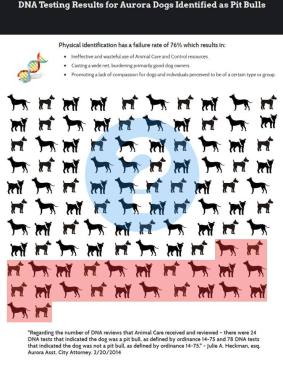It is time to take a look back at 2014, and what the year has brought us in the world of breed discriminatory laws. 2013 was a good year, but pales in comparison to what happened this year.
Below is a list of passages, repeals and rejections of breed discriminatory laws, as well as some notable court cases. For our purposes, rejection means when a breed discriminatory law of any kind was brought up by an official and discussed. Because of this, this list may vary from what others consider a rejection, which differs greatly depending on who is asked. We use this definition in order to have a base from year to year, with which to compare.
Repeals:
Kennet, MO
Bonner Springs, KS
Canton, MI
Waterloo, WI
Bradford, PA
Clayton, MO
Garden City, KS
South Bend, Indiana
Washington Court, OH
Dearborn County, Indiana
Muscoda, WI
Hallsville, MO
Spring Hill, KS
Fairway, KS
Moreauville, LA
Cambridge, WI
16 total
Partial repeal:
Whitepine, Tennessee
Rejection:
El Dorado KS-rejected adding breeds to existing law
Cincinnati, OH
League City, TX
Terrebonne Parish, Louisiana
Randolph County, AR
Madison, WI
Medford, OR
Monticello, AR
Springdale, AR
Baker City, OR
10 total
Passage:
Lake Elsinore, CA MSN
Carroll County, MS
Humphrey, AR (“pit bulls” Rottweilers and Bull Mastiffs)
3 total
State:
In 2014 both Utah and South Dakota passed state-wide prohibitions against breed discriminatory laws. Washington, Missouri and Maryland all attempted similar bills but ultimately the bills died at some point in the process.
Maryland: Legislators finally passed a bill that over turned the disastrous court of appeals ruling in the case of Tracey v Solesky. Legislators were hung up on the standard of liability for dog owners, but were unanimous about the need to over rule the landlord liability for dog bites and the breed discriminatory part of the ruling. They finally reached a consensus after years of debate.
Court cases:
New Llano, Louisiana: Unenforceable by court order. The Nelson family sued the town of New Llano after they were told to remove their dog from the town or risk her being killed. The Nelsons had just moved to New Llano and were un-aware of the ban. Mazzy was held in boarding for a long time as the court case went through the process. An injunction was filed and granted by the judge. This case is still technically active.
Clay, Alabama: In early 2013, the town of Clay passed a breed ban. This was immediately challenged and mid 2013 an injunction was filed. 2014 saw that case before the courts and the judge ruled against the town. A couple notable things about that case was the judge saying that the town cannot ban something they have had no issue with. Officials admitted the ban was passed after the read an article about “pit bulls.”
We have seen repeated victories in court against Reynoldsburg, Ohio’s law, though they remain at the level of municipal court and are limited to people keeping their dogs and not challenging the law itself.
Aurora, Co: Aurora became the second city to put a breed discriminatory law on the ballot and, though the ballot measure ultimately failed, we saw amazing success in messaging, as well as a stark reminder that many people are not even aware they are living under these laws. A full analysis of the events can be found here: https://stopbsl.org/2014/11/06/aurora-colorado-the-good-the-bad-and-the-silver-lining/
2014 was a remarkable year for the rights of individuals and community safety. More and more municipalities are seeing the failure of breed discriminatory laws and overturning them. No doubt 2015 will be better.
It can be easy to lose sight of the larger picture when dealing with this fight day in and day out. We hope that this post shows that the tide is, in fact, turning against breed discriminatory laws, and laws that target irresponsible and reckless owners are winning out.
If you know of a repeal, rejection or enactment that is not on this list, please let me know by e-mailing StopBSL.org@gmail.com.






